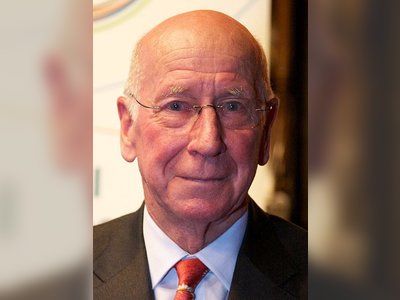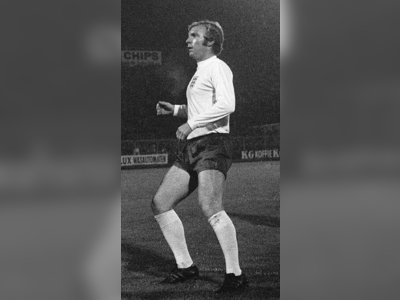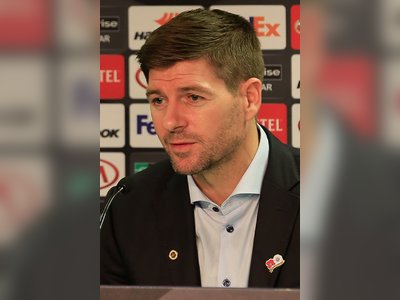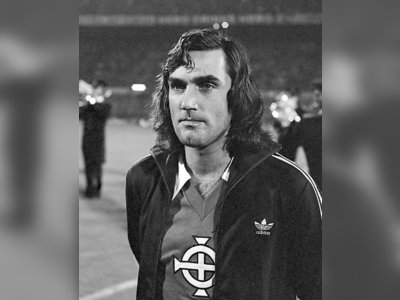British Heritage
Remember, Cherish, Learn.
beta
Stuart Pearce
A Testament to English Football Heritage.
Stuart Pearce's story is a riveting tale of a dedicated sportsman whose journey through English football has left an indelible mark on the British heritage. As an emblem of British football history, his contributions as both a player and manager continue to shape the course of English football today.
Born on 24 April 1962, Stuart Pearce rose through the ranks of English football from a tough and no-nonsense player to a respected coach. Known as "Psycho" due to his unforgiving style of play, he represented clubs such as Coventry City, Nottingham Forest, Newcastle United, West Ham United, and Manchester City, in a professional career that spanned over two decades.
He is particularly celebrated for his time at Nottingham Forest, where he donned the captain's armband with grit and pride. During his tenure at Forest, he emerged as the club's most capped international, earning 76 of his 78 caps for England while representing the club. His captaincy saw him lead the national side on nine occasions, underscoring his leadership and influence in English football.
In a testament to his love for the game and an effort to support grassroots football, Pearce briefly came out of retirement in 2016, playing a single match for Longford, a team then described as "the worst in Great Britain".
His transition to coaching was as eventful as his playing career. Pearce first tasted management with Nottingham Forest in a caretaker capacity from December 1996 to May 1997. After hanging up his boots in 2002, he further entrenched himself into the world of coaching, working under Kevin Keegan at Manchester City. Following a short spell as the caretaker manager at City, he took over the reins permanently in 2005.
Pearce took charge of the England U21 team in 2007, leading them to the semi-finals of the 2007 UEFA Under-21 Championship. His tenure with the U21 side had a mix of ups and downs, culminating in a runners-up finish in the 2009 UEFA Under-21 Championship. Yet, he did not get his contract renewed in 2013 after failing to progress from the group stages in the same tournament.
His managerial experience also extended to international duties, serving as an assistant to Fabio Capello and taking the helm of the Great Britain Olympic football team for the 2012 Summer Olympics. After a brief return to Nottingham Forest and a stint with Portsmouth, Pearce is currently a first-team coach at West Ham United.
Pearce was born in Shepherd's Bush, Hammersmith, London, the youngest of four children. His early life saw him navigate various challenges, shaping the resilient character that would come to define his footballing career. Pearce took his first steps in football at Wealdstone, a non-league club, while working as an electrician.
His exceptional talent was evident early on, attracting a £30,000 offer from Coventry City in 1983, a hefty sum for a semi-professional player at the time. He made the leap to professional football reluctantly, but it was here that his combative and determined style of play came to the fore.
In 1985, Pearce moved to Nottingham Forest, where he became an integral part of the team's identity. It was here that his career truly took off, and his contributions to the club were instrumental in its successes during that period.
Despite the uncertainties about his football future, Pearce etched a remarkable career at Forest, spending twelve years with the club, most of which as a captain. During his time at Forest, Pearce led his team to win two League Cups and the Full Members Cup. He also left an indelible mark in the 1991 FA Cup final by scoring from a free-kick, even though Forest eventually lost to Tottenham Hotspur.
Pearce's tenure at Forest was also marked by the tragic Hillsborough disaster. However, he and his teammates stood resilient and were able to finish third in the league that year, also securing victories in the League Cup and Full Members Cup.
Pearce's commitment to Nottingham Forest shone bright even in the face of relegation in 1993. Choosing to stay with the club, he captained the side back to the top flight of English football, further strengthening his legacy at the City Ground.
Stuart Pearce's journey through English football, both as a player and a coach, is a testament to his unwavering dedication to the sport. His legacy in British football is felt across all levels of the game, from the Premier League to grassroots football, underscoring his commitment and contributions to the British football heritage.
Player to Coach: Transitioning with Excellence
Born on 24 April 1962, Stuart Pearce rose through the ranks of English football from a tough and no-nonsense player to a respected coach. Known as "Psycho" due to his unforgiving style of play, he represented clubs such as Coventry City, Nottingham Forest, Newcastle United, West Ham United, and Manchester City, in a professional career that spanned over two decades.
He is particularly celebrated for his time at Nottingham Forest, where he donned the captain's armband with grit and pride. During his tenure at Forest, he emerged as the club's most capped international, earning 76 of his 78 caps for England while representing the club. His captaincy saw him lead the national side on nine occasions, underscoring his leadership and influence in English football.
In a testament to his love for the game and an effort to support grassroots football, Pearce briefly came out of retirement in 2016, playing a single match for Longford, a team then described as "the worst in Great Britain".
A Legacy Carved on the Touchline
His transition to coaching was as eventful as his playing career. Pearce first tasted management with Nottingham Forest in a caretaker capacity from December 1996 to May 1997. After hanging up his boots in 2002, he further entrenched himself into the world of coaching, working under Kevin Keegan at Manchester City. Following a short spell as the caretaker manager at City, he took over the reins permanently in 2005.
Pearce took charge of the England U21 team in 2007, leading them to the semi-finals of the 2007 UEFA Under-21 Championship. His tenure with the U21 side had a mix of ups and downs, culminating in a runners-up finish in the 2009 UEFA Under-21 Championship. Yet, he did not get his contract renewed in 2013 after failing to progress from the group stages in the same tournament.
His managerial experience also extended to international duties, serving as an assistant to Fabio Capello and taking the helm of the Great Britain Olympic football team for the 2012 Summer Olympics. After a brief return to Nottingham Forest and a stint with Portsmouth, Pearce is currently a first-team coach at West Ham United.
The Making of Stuart Pearce
Pearce was born in Shepherd's Bush, Hammersmith, London, the youngest of four children. His early life saw him navigate various challenges, shaping the resilient character that would come to define his footballing career. Pearce took his first steps in football at Wealdstone, a non-league club, while working as an electrician.
His exceptional talent was evident early on, attracting a £30,000 offer from Coventry City in 1983, a hefty sum for a semi-professional player at the time. He made the leap to professional football reluctantly, but it was here that his combative and determined style of play came to the fore.
Nottingham Forest: A Club and a Career Defined
In 1985, Pearce moved to Nottingham Forest, where he became an integral part of the team's identity. It was here that his career truly took off, and his contributions to the club were instrumental in its successes during that period.
Despite the uncertainties about his football future, Pearce etched a remarkable career at Forest, spending twelve years with the club, most of which as a captain. During his time at Forest, Pearce led his team to win two League Cups and the Full Members Cup. He also left an indelible mark in the 1991 FA Cup final by scoring from a free-kick, even though Forest eventually lost to Tottenham Hotspur.
Pearce's tenure at Forest was also marked by the tragic Hillsborough disaster. However, he and his teammates stood resilient and were able to finish third in the league that year, also securing victories in the League Cup and Full Members Cup.
Pearce's commitment to Nottingham Forest shone bright even in the face of relegation in 1993. Choosing to stay with the club, he captained the side back to the top flight of English football, further strengthening his legacy at the City Ground.
Stuart Pearce's journey through English football, both as a player and a coach, is a testament to his unwavering dedication to the sport. His legacy in British football is felt across all levels of the game, from the Premier League to grassroots football, underscoring his commitment and contributions to the British football heritage.
- Stuart Pearceen.wikipedia.org







